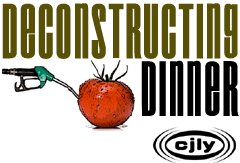
The Local Grain Revolution I
For most Canadians wishing to adopt a more local diet, the overwhelming rise in demand in just the past year has left a large question mark hovering over the heads of many: where is all this local food so many are demanding?
The state of farming and food production in North America has clearly evolved into such a poor state of affairs, little infrastructure and incentive remain to respond to this current demand for local product. While fruits and vegetables may be the most easily accessible local foods at farmers' markets and select grocery stores, grains are not often referred to when speaking of local food. When we start to envision what plant-based foods we're still missing out on in sufficient local quantities, we can list off wheat, oats, barley, rye, spelt, flax, hemp, corn and leguminous plants such as beans and lentils.
On this exciting broadcast, we explore the creation of a project launched by two conservation groups wishing to experiment with the creation of a local grain market in the middle of the mountains of British Columbia. Matt Lowe of Nelson's West Kootenay EcoSociety and Brenda Bruns of the Creston branch of Wildsight have teamed up with a number of farmers, processors, bakers and eaters, to see if such an idea is indeed possible.
The project will see three Creston-area farmers commit to growing three types of grain in the coming 2008 season. Two-hundred member-shares will be issued to residents of Nelson and Creston, and come harvest time, those 200 members, will hopefully receive 100 lbs of whole grains. If requested, a miller in Creston and Nelson will be on hand to turn those grains into flour or flakes. This will ensure members are only using the freshest, tastiest and most nutritious product available.
Guests/voices
Matt Lowe, climate change campaigner, West Kootenay EcoSociety (Nelson, B.C.) -- The West Kootenay EcoSociety promotes ecologically and socially sound communities while protecting species and ecosystems in the Southern Columbia Mountains ecoregion. The organization hosted a highly successful regional climate change conference in 2007.
Drew Gailius, farmer, Full Circle Farm (Canyon, B.C.) -- Drew and Joanne Gailius are new farmers. They sell most of their product at the farmgate. In the past two years, they have successfully grown wheat and oats and are eager to find a local market to supply.
Other Voices: Keith Huscrof (Lister, B.C.), Brenda Bruns (Creston, B.C.), Jenny Truscott (Creston, B.C.), David Everest (Nelson, B.C.).
Deconstructing Dinner in Our Schools II
How do food and agricultural issues make their way into educational settings? On this episode of Deconstructing Dinner in Our Schools, we hear from 10-year-old Kodiak Morasky, who chose a very unique topic to present to his Grade 4 classmates in Nelson, B.C. Kodiak was introduced to the world of factory animal farms through the online animated series of short films known as The Meatrix. The film had a profound impact on Kodiak, and we listen in on his in-class presentation. Upon learning of the horrific stories coming out of North America's factory farms, we hear one child ask, "Can I sue the government?"
Guests/voices
Kodiak Morasky, student, Blewett Elementary School (Nelson, B.C.) -- Kodiak's 10 years of age shouldn't fool you. He is deeply concerned with the state of Canada's food supply. His concerns include factory animal farms, genetic engineering and chemical pesticides, among others. He is passionate about sharing this information with his friends and classmates.
Related Tyee stories:
- So, You Want to Be a Farmer?
Podcast: Who will help raise Canada's food? Why not you? - Food For Thought in Our Schools
Podcast: What are we feeding the kids? - With the Grain on the 100-Mile Diet
Stalking barley and wheat, some of it 9,000 years old.
Read more: Podcasts, Food, Deconstructing Dinner, Environment














Tyee Commenting Guidelines
Comments that violate guidelines risk being deleted, and violations may result in a temporary or permanent user ban. Maintain the spirit of good conversation to stay in the discussion.
*Please note The Tyee is not a forum for spreading misinformation about COVID-19, denying its existence or minimizing its risk to public health.
Do:
Do not: